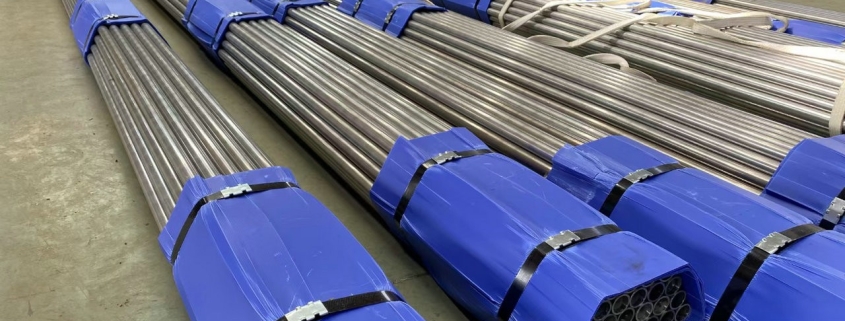09CrCuSb: The Most Ideal Steel for H2SO4 Dew Point Corrosion Resistance
Introduction
Material selection is pivotal in ensuring efficiency, longevity, and resistance to various forms of corrosion in industrial applications like boilers, heat exchangers, economizers, and air preheaters. Among these, sulfuric acid dew point corrosion remains among the most challenging. Enter 09CrCuSb (ND steel)—a specialized low-alloy steel designed to combat sulfuric acid dew point corrosion. This post will show how ND steel works, why it’s essential for your operations, and how it can be leveraged for long-term, reliable performance in demanding environments.
The Problem: Sulfuric Acid Dew Point Corrosion
In industrial equipment like boilers and heat exchangers, flue gases are often by-products of combustion. These gases contain sulfur oxides (SOx), which form sulfuric acid (H2SO4) when combined with water vapor. When the temperature of the equipment surface falls below the dew point of sulfuric acid (typically between 120°C and 150°C), the acid condenses and starts to erode the steel surfaces. This phenomenon, known as dew point corrosion, is particularly problematic in equipment that handles gas at lower temperatures, such as economizers and air preheaters.
Left unchecked, sulfuric acid corrosion can lead to:
- Rapid material degradation.
- Increased maintenance costs.
- Reduced operational efficiency.
- Risk of equipment failure, leading to downtime.
The Solution: 09CrCuSb (ND Steel)
Developed specifically to withstand sulfuric acid dew point corrosion, 09CrCuSb (ND steel) is a low-alloy steel that combines corrosion resistance with mechanical strength. It is the material of choice for industries dealing with flue gases and acidic environments.
Critical features of ND steel include:
- Excellent Sulfuric Acid Resistance: The inclusion of chromium (Cr), copper (Cu), and antimony (Sb) enhances the steesteel’slity to resist sulfuric acid corrosion, especially in high-dew-point conditions.
- Low-Temperature Performance: ND steel exhibits superior performance in low-temperature environments typical of economizers and air preheaters, where sulfuric acid condensation is most likely to occur.
- High Strength and Durability: The alloy composition ensures that the steel remains strong and durable under fluctuating temperatures and corrosive conditions, reducing the need for frequent replacements or repairs.
- Cost-Effective Maintenance: While ND steel may have a higher upfront cost than other materials, its longevity and corrosion resistance translate into significant cost savings over time due to fewer repairs and less downtime.
Common Applications
ND steel is instrumental in industrial applications where sulfuric acid corrosion is a concern:
- Boilers: Sulfur-containing fuel in boilers makes ND steel ideal for parts susceptible to acid dew point corrosion, such as heat-exposed surfaces.
- Heat Exchangers: In applications where the temperature drop results in condensation of sulfuric acid, ND steel offers a protective solution, increasing the lifespan of heat exchanger tubes.
- Economizers: Located in the calmer sections of the flue gas path, economizers are prone to dew point corrosion. ND steel assistance helps maintain efficiency and reduce operational costs.
- Air Preheaters: These components are at significant risk due to the cooling of flue gases, making ND steel crucial for durability and performance in acidic environments.
Advantages of Using 09CrCuSb in These Applications
- Improved Operational Lifespan: ND steel’s exceptional resistance to sulfuric acid prolongs the life of boilers, heat exchangers, and air preheaters, reducing the need for frequent replacements.
- Lower Maintenance Costs: Thanks to its durability, ND steel minimizes the need for repairs, saving time and money. Reduced corrosion also means fewer emergency shutdowns, improving overall system reliability.
- Increased Efficiency: By mitigating the damaging effects of dew point corrosion, ND steel helps maintain heat transfer efficiency in boilers and heat exchangers, leading to optimal energy usage and lower fuel costs.
- Safety Enhancement: Corrosion can lead to dangerous equipment failures, particularly in high-temperature and pressure environments. ND steel corrosion resistance reduces the likelihood of such failures, improving operational safety.
Key Considerations When Choosing ND Steel
While 09CrCuSb offers a multitude of benefits, it’s essential to approach its implementation with careful consideration. Here are a few factors to keep in mind:
- Temperature Conditions: While ND steel is highly effective at temperatures close to the sulfuric acid dew point, alternative materials might need to be used in conjunction with it in very high-temperature environments.
- Cost vs. Benefit: Although ND steel may have a higher upfront cost, the savings on long-term maintenance, downtime, and replacement justify the investment, especially in sulfur-rich environments.
- Installation Expertise: Proper installation and welding techniques are critical to unlocking the full benefits of ND steel. To avoid installation-related issues, ensure that your service providers are experienced with this specialized material.
Corrosion Rate Comparison of ND Steel and Other Steels in Sulfuric Acid Environments
One of the most critical considerations when selecting materials for industrial applications prone to sulfuric acid dew point corrosion is the corrosion rate in sulfuric acid solutions. To further emphasize the superiority of 09CrCuSb (ND steel), let’s compare its corrosion rate with that of other standard steels such as CR1A, 1Cr18Ni9, S-TEN 1 & 2, 20G, CORTEN-A, A3 (Q235B) in a 70°C, 50% H2SO4 (sulfuric acid) solution for 24 Hours.
Corrosion Rate Data
The table below provides a comparison of corrosion rates for different steels, expressed in mm/year in a solution of 70°C/50% H2SO4/24 Hours:
| Steel Type | Corrosion Rate (mg/cm²h) | Corrosion Rate (mm/a) (a=annual) |
| 09CrCuSb (ND Steel) | 7.3 | 8.18 |
| CR1A | 13.4 | 15.01 |
| 1Cr18Ni9 | 21.7 | 24.30 |
| S-TEN 1 & 2 | 27.4 | 30.69 |
| 20G | 56.4 | 63.17 |
| CORTEN-A | 63.0 | 70.56 |
| A3 (Q235B) | 103.5 | 115.92 |
Key Observations:
- 09CrCuSb (ND Steel) offers the best corrosion resistance among all the materials listed, with a corrosion rate of only 7.3 mg/cm²h and 8.18 mm/year. This indicates that ND steel is highly effective in environments exposed to sulfuric acid, particularly in flue gas systems, economizers, and air preheaters.
- CR1A and 1Cr18Ni9 (stainless steels) show moderate corrosion resistance but still underperform compared to ND steel. They are commonly used in acidic environments, but their corrosion rates of 13.4 mg/cm²h and 21.7 mg/cm²h, respectively, are still considerably higher than ND steel’s TEN 1 & 2 steels. These steels, which are specialized corrosion-resistant materials, exhibit corrosion rates of 27.4 mg/cm²h and 30.69 mm/year, much higher than ND steel. While these steels are still suitable for acid-resistant applications, ND steel outperforms them in sulfuric acid exposure.
- 20G and CORTEN-A both have very high corrosion rates, at 56.4 mg/cm²h and 63.0 mg/cm²h, respectively, making them unsuitable for long-term use in environments with prevalent sulfuric acid dew point corrosion.
- A3 (Q235B) shows the highest corrosion rate, at 103.5 mg/cm²h and 115.92 mm/year, confirming its unsuitability for applications involving sulfuric acid exposure, especially in low-temperature sections of flue gas systems.
Why ND Steel Outperforms Others
The 09CrCuSb (ND steel) achieves its remarkable corrosion resistance due to the presence of chromium (Cr), copper (Cu), and antimony (Sb) in its composition. When exposed to sulfuric acid, these elements form a protective layer on the steel surface, drastically slowing down the corrosion process. This protective film is chemically stable and resistant to the acidic environment, thus offering better long-term performance than other steel types.
- Chromium (Cr) increases corrosion resistance by forming a thin oxide layer as a barrier.
- Copper (Cu) enhances resistance in acidic environments by improving steesteel’s durability.
- Antimony (Sb) stabilizes the passive layer, inhibiting corrosion, particularly in sulfuric acid.
How to Extend the Life of Your Equipment with ND Steel
To maximize the benefits of ND steel and extend the life of your industrial equipment, consider the following best practices:
- Routine Inspections: Regularly inspect areas exposed to sulfuric acid and high temperatures to catch any early signs of wear or corrosion.
- Proper Cleaning and Maintenance: Clean your equipment frequently to prevent sulfur buildup, which can accelerate corrosion even with corrosion-resistant materials.
- Optimal Operating Temperatures: Ensure your equipment operates within the recommended temperature range to avoid excessive thermal stress that could compromise material integrity.
- Partner with Trusted Suppliers: Work with suppliers who understand your specific needs and can provide high-quality 09CrCuSb materials and technical support for installation and maintenance.
Conclusion
The data shows that 09CrCuSb (ND Steel) is far superior to the other steels for resisting sulfuric acid corrosion. Its corrosion rate is significantly lower than that of common alternatives like CR1A, S-TEN, and CORTEN-A. Therefore, ND steel is an excellent choice for industrial applications where long-term performance, safety, and reduced maintenance costs are critical—such as boilers, heat exchangers, and economizers exposed to acidic flue gases.
In industrial applications where sulfuric acid dew point corrosion is a severe concern, 09CrCuSb (ND steel) is a reliable, durable, and cost-effective solution. Its strength, corrosion resistance, and performance in harsh environments make it an excellent choice for equipment like boilers, heat exchangers, economizers, and air preheaters. By choosing ND steel, industries can enhance operational efficiency, reduce downtime, and minimize long-term maintenance costs.
If you want to protect your industrial equipment from sulfuric acid corrosion and extend its operational lifespan, 09CrCuSb (ND steel) is a material that deserves serious consideration. Contact an expert today for more detailed technical information or consultation on how to implement ND steel in your systems.




